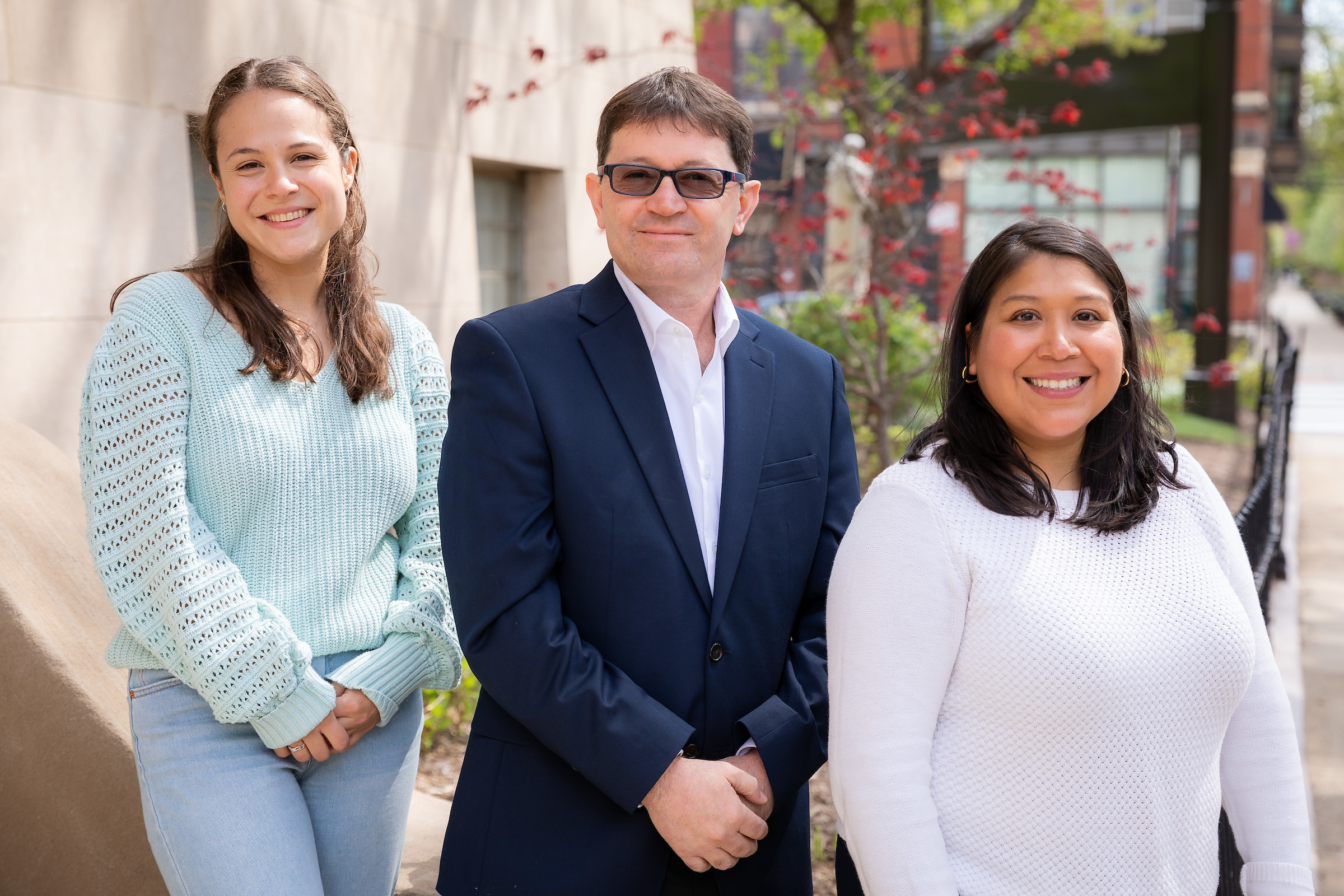 Laura Salada, Antonio Polo and Elizabeth Martinez-Charleston are working with Chicago Public Schools to study and address anxiety and depression in elementary and middle school children. (DePaul University/Jeff Carrion)
Laura Salada, Antonio Polo and Elizabeth Martinez-Charleston are working with Chicago Public Schools to study and address anxiety and depression in elementary and middle school children. (DePaul University/Jeff Carrion)
DePaul professor Antonio Polo and his team of graduate researchers have been making headlines in Chicago. Their
latest study found Latinx children in Chicago Public Schools were up to twice as likely than their peers to experience anxiety and depression, both before and during the COVID-19 pandemic. The findings, published in the Journal of Clinical Child and Adolescent Psychology, have been covered on
local TV and radio, raising awareness among parents and educators.
For Polo and his students in the
Culture and Evidence-Based Practice Lab, it isn't enough just to study the problem. What matters most is putting the research into action to help children and their families. Along with evaluating youth for mental health problems, the team has been delivering the
Act and Adapt program — an evidence-based intervention to help students cope.
"For many years, proven interventions stayed in the ivory tower or were limited in scope. Our goal has been to disseminate this program and make it accessible," says Polo, a professor of clinical child psychology who helped develop the program.
With support from the CPS Office of Social and Emotional Learning, more than 270 personnel — including school social workers, school counselors and school psychologists — have received training and delivered Act and Adapt since 2017. Polo's graduate students are helping to drive this change, and the experience is helping to position them for careers as change-making clinical psychologists.
Laura Saldana is a fourth-year doctoral student in the clinical child psychology program and was drawn to DePaul because of Polo's intervention work in the community. She was recently awarded the highly prestigious and competitive Doctoral Fellowship in Mental Health and Substance Abuse Services from the Minority Fellowship Program of the American Psychological Association.
"Working with Antonio, I've been able to see the immediate and broad impact that happens when mental health services are accessible," Saldana says. "That's what our lab is all about."
Bringing findings into the CPS classroom
Saldana and Elizabeth Martinez-Charleston were among the team who assessed some 1,220 elementary and middle school students for the study. Each year, they also train Chicago Public Schools school-based providers to deliver the Act and Adapt program. As bilingual Latinas, they say representation in mental health professions matters.
"I grew up in Chicago, and it can be hard to find a mental health provider who speaks Spanish. I wanted to contribute to my community, and that's why I was drawn to DePaul," Martinez-Charleston says.
A highlight for the team has been witnessing students' resilience and willingness to try new approaches to coping with stress. One of Martinez-Charleston's favorite activities empowers students to act out what "putting your worst foot forward" might look like. Then students consider how a positive attitude changes how people perceive them. "At the end when we ask about their favorite skill, everyone's eager to answer," she says. "It's great to see they've learned the material and that it's fun for them."
While stigma begins to fade, mental health problems still on the rise
To be sure, many of the issues facing Latino students are systemic, as the
recent study details. Polo and others have researched the many layers of stress in Latino students' lives.
"Consistently we find Latino youth are experiencing acculturation stress from being discriminated against, as well families facing language barriers," Polo says. "Latinos have additional stressors around family separations, hostile immigration policies and attacks on families of color."
During the pandemic, many children had family members who worked as essential workers and were not as protected from COVID-19 as people who could work from home. Youth were worried about their families getting sick, Polo explains.
And while rates of anxiety and depression are on the rise, there are signs of hope. The students who engage in the Act and Adapt program are the lab's main inspiration. Polo's team evaluates each student's progress and provides feedback and reports to track their outcomes. Students who participate in Act and Adapt report significant gains in their mood and well-being and say they enjoyed the program and would recommend it to others.
"Young people are teaching us to be comfortable speaking about mental health," says Polo. "We are helping families recognize that symptoms of anxiety and depression are not uncommon, and that it's important to reach out and get help."
Through this research, Saldana has seen how offering an intervention in schools removes barriers for students who might not otherwise have access to these services.
"There is such investment needed for more mental health services in school-based settings and support for school-based providers," Saldana says. "It's been meaningful to me as a clinician-in-training to work within the school and to see how flexible and effective the program can be."
 Graduate students in the
Culture and Evidence-Based Practice Lab bring proven mental health interventions into schools and the community. (DePaul University/Jeff Carrion)
Graduate students in the
Culture and Evidence-Based Practice Lab bring proven mental health interventions into schools and the community. (DePaul University/Jeff Carrion)